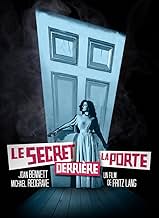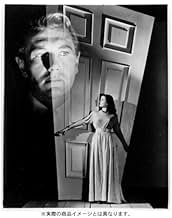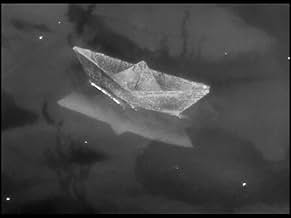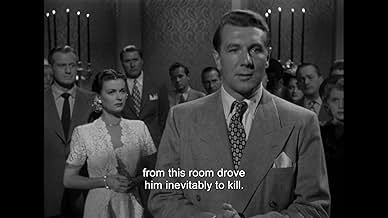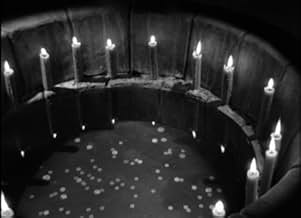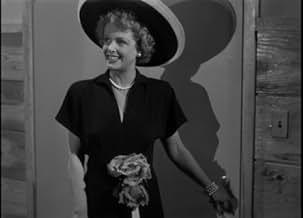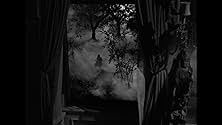Uma rica herdeira de Nova York viaja para o México e se apaixona por um arquiteto, com o qual se casa imediatamente, mas surpresas desagradáveis a aguardam quando ela vai viver na mansão que... Ler tudoUma rica herdeira de Nova York viaja para o México e se apaixona por um arquiteto, com o qual se casa imediatamente, mas surpresas desagradáveis a aguardam quando ela vai viver na mansão que ele projetou e construiu na costa Leste.Uma rica herdeira de Nova York viaja para o México e se apaixona por um arquiteto, com o qual se casa imediatamente, mas surpresas desagradáveis a aguardam quando ela vai viver na mansão que ele projetou e construiu na costa Leste.
- Direção
- Roteiristas
- Artistas
- Altar Boy
- (não creditado)
- Townsman
- (não creditado)
- Sarah
- (não creditado)
- Guest in Home Tour
- (não creditado)
- Guest in Home Tour
- (não creditado)
- Judge
- (não creditado)
- Small Mexican Knife Fighter
- (não creditado)
- Country Squire
- (não creditado)
- Direção
- Roteiristas
- Elenco e equipe completos
- Produção, bilheteria e muito mais no IMDbPro
Avaliações em destaque
Joan Bennett plays Celia, a young lady who acquires a large amount of money after her brother's death and decides to take a holiday. It is here that she meets Mark Lamphere (Michael Redgrave), a mysterious and charming gentleman who excites in Celia intense suppressed feelings of rebellion and exhilaration. Following their marriage, a hastily-decided proposition that can only lead to trouble, Celia immediately begins to notice peculiarities in her new husband, and, after her arrival at Mark's extravagant residence, she finds the dwelling haunted by the shadow of his previous wife. Mark, it seems, houses an unhealthy preoccupation with murder, and has made a hobby out of collecting entire rooms in which unspeakable atrocities of passion were committed. But what of the one room that is kept securely locked, never to be opened by anyone? Celia concludes that the secret to unlocking the inner depths of her husband's disturbed mind lies within that single room, beyond the forbidden door. Though Silvia Richards' screenplay, from a story by Rufus King, often seems too incredible to take seriously, Lang's film remains an interesting achievement, and is nothing if not entertaining.
I found the promotional material for 'Secret Beyond the Door' to be grossly misleading. The image of Joan Bennett standing before a significantly-distorted door prompted me to expect a film of extreme German Expressionism, in the same vein as 'The Cabinet of Dr. Caligari (1920).' Fritz Lang, who developed his career in Germany during the 1920s, and having often used elements of the style, would presumably have been very adept at recreating the devilishly-twisted labyrinths of the human mind, but the only scene to even approach my stylistic expectations was the appropriately ambiguous and shadowy dream sequence, in which Michael Redgrave both prosecutes and defends his malevolent tendencies in court {this particular scene may even have influenced Hitchcock's heavily-stylised courtroom trial in 'Dial M for Murder (1954)}. The remainder of the film has the appearance of a typical 1940s film noir, with suitably shadowy cinematography by Stanley Cortez, supplemented by a voice-over by Joan Bennett. Also note the similarity between the character of Miss Robey (Barbara O'Neil) and Mrs. Danvers (Judith Anderson) from 'Rebecca,' most particularly in their respective final actions in each picture.
After a whirlwind romance, Celia Barrett (Bennett) marries Mark Lamphere (Redgrave) but finds once the honeymoon is over his behaviour becomes quite odd...
A troubled production and troubling reactions to it by the critics and Lang himself! Secret Beyond the Door is very much in the divisive half of Lang's filmic output. Taking its lead from classic era Hollywood's keen interest with all things Freudian, and doffing its cap towards a number of "women in peril at home" films of the 1940s, it's a picture that's hardly original. Yet in spite of some weaknesses in the screenplay that revolve around the psychological troubles of Mark Lamphere, this is still a fascinating and suspenseful picture.
I married a stranger.
Draped in Gothic overtones and astonishingly beautiful into the bargain, it's unmistakably a Lang film. His ire towards the cast and studio, where he was usurped in the cutting room and with choice of cinematographer, led Lang to be very dismissive towards the piece. However, it contains all that's good about the great director. Scenes such as the opening involving a paper boat on ripples of water, or a sequence that sees Mark dream he is in a courtroom full of faceless jurors, these are indelible images. Then there's the lighting techniques used around the moody Lamphere mansion that are simply stunning, with Cortez (The Night of the Hunter) photographing with atmospheric clarity.
Blades Creek, Levender Falls.
Elsewhere the characterisations are intriguing. Mark is troubled by something and we learn it's about women in his life, while his "hobby" of reconstructing famous murder scenes in the rooms of the mansion, is macabre and really puts a kinky distortion in the narrative. Celia marries in haste but is surprisingly strong, her character arc given heft by the fact we think she may well be prepared to die for love. Then there's the house secretary, Miss Robey (O'Neil), a shifty woman with a headscarf covering an unsightly scar on one side of her face, and Mark's young son David (Mark Dennis) who is cold and detached and has some disturbing theories on his father's means and motivations.
Lilacs and locked doors.
Cast performances are not all top grade, and even though Redgrave doesn't push himself to required darker territories, the performances are involving and worthy of the viewer's undivided attention. Rózsa's musical score is a cracker, deftly switching from the romantic swirls that accompany Mark and Celia during their love courting, to being a stalking menace around the Lamphere house and misty grounds when danger and psychological distortion is near by. Technically it's a remarkable movie, where even allowing for some daftness involving the psychobabble, it's a picture that Lang fans can easily love. There are those who detest it, very much so, but if it does hit your spot it will get inside you and stay there for some time afterwards. 8/10
Why would Joan marry and stay with someone so utterly stiff and charmless as Michael Redgrave?? The male lead should have been given to someone more mysterious and attractive. They were hoping for a new Laurence Olivier...
Joan is a treat as always. I love how she comes across as a spoiled debutante who can hardly care to utter her lines with any conviction. She´s a good actress -just a bit too laid back at times. I love her, she is so stunningly beautiful and cool in her Hollywood wardrobes.
I love the whole atmosphere of the movie. It´s slow at first and then from the honeymoon in Mexico and forward so mysterious! I love her bedroom with the tapestry! The thing with the room-collecting was quite farfetched but fun. Who would REALLY aquire complete scenes of murders at home???? I´m going to see it again soon and learn some lines. They don´t make them like they used to!
Fritz Lang's bleak cinematography and haunting use of music help to create the atmosphere that a story of this nature needs in order to work effectively. The focus on the door helps to create the tension as to what the secret is throughout the movie, and Fritz Lang seems keen to capitalise on that as we see Joan Bennett's narration change from how she feels personally to driving herself crazy as she tries to decipher what's behind the door. The characters in the story are interesting, and they need to be as this film is mostly character based. We follow Celia Lamphere, and we are given her thoughts by way of the aforementioned narration. Narration is often found in scripts that have been written by people that don't know how to write good scripts. However, in this case it actually helps the film to move along. In order for the story to work, we need to know what the character is feeling, so in this case narration is helpful to the story.
As I've mentioned, the ending isn't all that good, but the suspense builds nicely and there's much to like about this film. If you're new to Fritz Lang, though, I certainly recommend the classics 'M' and 'Metropolis' before this, and also from his American films; 'Fury', 'Scarlet Street', 'Beyond a Reasonable Doubt' and 'While the City Sleeps' get my thumbs up.
I watched this on the back of positive reviews from a couple of people on this site; perhaps I should have read further though because I didn't find the wonderfully intelligent noir that they claimed to have seen. Perhaps these commentators have not seen the film Rebecca which sort of covers similar themes but does it much, much better than this film does, but for me I found it hard to care about this. Visually I liked it and credit to Lang because his direction and work with his cinematographer does produce some really well set up scenes that do have great atmosphere. However this is not repeated in the material which is not as intelligent as it would like to think itself. Indeed it is terribly overwrought and melodramatic and offers little to counter it.
As a result the cast have to thanklessly play it up the best they can. I thought than Bennett did as good a job as she could have hoped to have done. She isn't brilliant though but she plays detective well. More important but not much cop is Redgrave; OK the blame lies more on the material than in his performance but given how little was conveyed by words at times, his performance was important but not up to the task.
Overall then, a fairly overdone melodrama that doesn't really convince in how it uses psychoanalysis to inform and direct its narrative. It may look great but the substance just isn't there from the start right down to the insultingly simplistic final scene.
Você sabia?
- CuriosidadesThe grove of trees through which Celia (Joan Bennett) runs when she flees the house is the same grove through which the Wolf Man ran in O Lobisomem (1941), also made by Universal. In particular, the tree, against which she leans, is the same one under which the Wolf Man was beaten.
- Erros de gravaçãoWhen Celia takes an impression of the key in wax, she only takes the impression on one side, which would render the key made from that impression useless without the reverse side.
- Citações
Mark Lamphere: You were living that fight. You soaked it all in - love, hate, the passion. You've been starved for feelings - any real feelings. I thought: 20th Century Sleeping Beauty. Wealthy American girl who has lived her life wrapped in cotton wool but she wants to wake up. Maybe she can.
Celia Barrett: Is it as hard as all that?
Mark Lamphere: Most people are asleep.
- ConexõesFeatured in Vampira: Secret Beyond the Door... 1947 (1956)
Principais escolhas
- How long is Secret Beyond the Door...?Fornecido pela Alexa
Detalhes
- Data de lançamento
- País de origem
- Idiomas
- Também conhecido como
- O Segredo da Porta Cerrada
- Locações de filme
- Empresa de produção
- Consulte mais créditos da empresa na IMDbPro
Bilheteria
- Orçamento
- US$ 1.500.000 (estimativa)
- Tempo de duração1 hora 39 minutos
- Cor
- Proporção
- 1.33 : 1
Contribua para esta página


